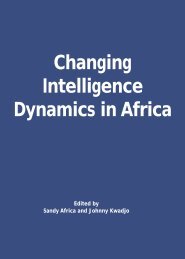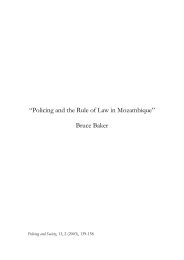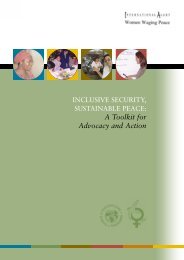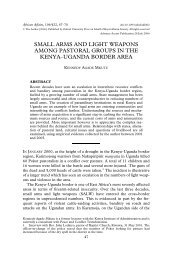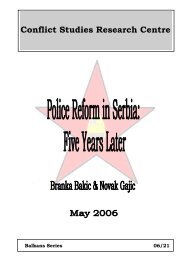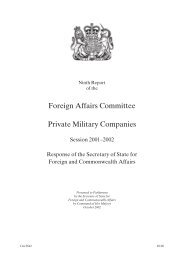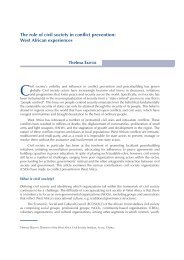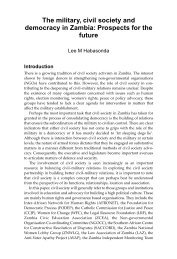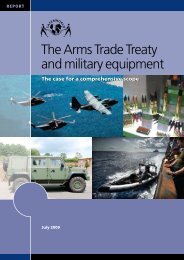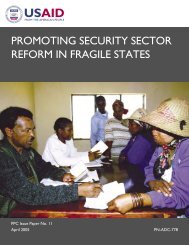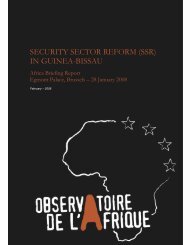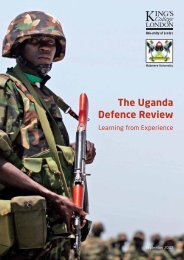AFGHANISTAN'S ELECTION CHALLENGES
AFGHANISTAN'S ELECTION CHALLENGES
AFGHANISTAN'S ELECTION CHALLENGES
You also want an ePaper? Increase the reach of your titles
YUMPU automatically turns print PDFs into web optimized ePapers that Google loves.
Afghanistan’s Election Challenges<br />
Crisis Group Asia Report N°171, 24 June 2009 Page 12<br />
The UNAMA human rights unit is also cooperating in<br />
a political rights verification exercise with the Afghanistan<br />
Independent Human Rights Commission; and a<br />
small separate elections unit has been created within<br />
the political section in Kabul. The UN’s good offices<br />
need to be exercised more often, given the fractured<br />
nature of the political system in which even technical<br />
issues can become highly politicised contests. It is<br />
also likely that the UN’s regional offices will have to<br />
be further drawn into the electoral process, helping<br />
coordinate efforts at a regional and provincial level.<br />
IV. 3INITIAL PROCESSES<br />
With the start of the election process, legal and institutional<br />
provisions are intersecting with the ground<br />
realities of growing insecurity, weak institutions and<br />
political manoeuvring. Even relatively simple processes<br />
are contested. With many of the necessary pre-election<br />
safeguards missing, much will depend of the conduct<br />
of the election from the preparations to the day itself –<br />
as well as the count process which follows, the latter<br />
proving the biggest technical challenge in 2005. The<br />
immediate focus, amid a challenging political and<br />
security environment, should be ensuring impartial<br />
bodies, a level playing field and an accepted arbitrator<br />
of disputes.<br />
A. 11SETTING THE DATE<br />
Even before the last election cycle finished, it was<br />
evident that “the electoral calendar implied in the current<br />
constitution does not appear functional in political,<br />
logistical or financial terms”. 86 An ad hoc committee<br />
was established to study the issue in October 2007 and<br />
had met twice by January 2008 but with little progress. 87<br />
The most pressing issue involved the date for the<br />
presidential poll. This had a clear constitutional timing:<br />
30 to 60 days prior to the end of the presidential term<br />
on 1 Jauza (Afghan calendar) on the fifth year after<br />
the last elections – in this case 22 May 2009. 88 First<br />
held in September 2005, provincial council elections<br />
are on a four-year cycle, although without a set date,<br />
while the Wolesi Jirga’s term expires on 1 Saratan<br />
(Afghan calendar) of the fifth year after its election –<br />
22 June 2010 – with elections to be held 30 to 60 days<br />
before. 89<br />
At the 2004 Loya Jirga a constitutional provision was<br />
added at the behest of the Northern Alliance that efforts<br />
would be made to hold the first presidential and<br />
National Assembly elections simultaneously. 90 This<br />
did not happen. Combining the presidential and parliamentary<br />
polls in this second round was considered<br />
86 “Post-Election Strategy Group Progress Report”, 27 September<br />
2005, p. 4. The current set-up would mean elections<br />
in 39 of the next 60 years. “Afghanistan Voter Registration<br />
2003 and Elections Projects 2004/2005”, Election Evaluation<br />
Mission”, p. 30.<br />
87 “Census and Elections: Update for JCMB VII”, Islamic<br />
Republic of Afghanistan, 29 January 2008, p. 2.<br />
88 Article 61 of the constitution.<br />
89 Article 83 of the constitution.<br />
90 Article 160 of the constitution.



